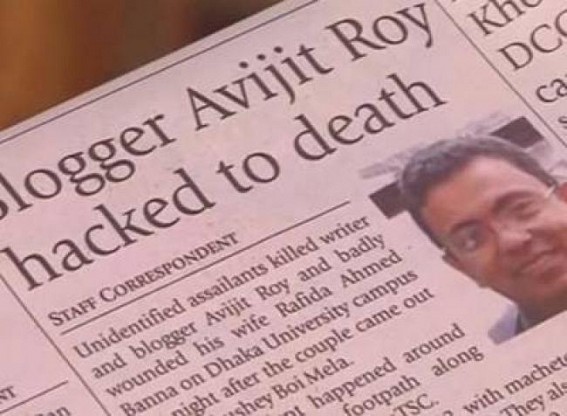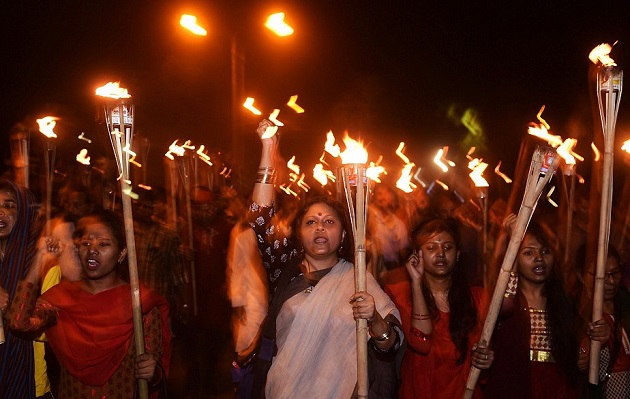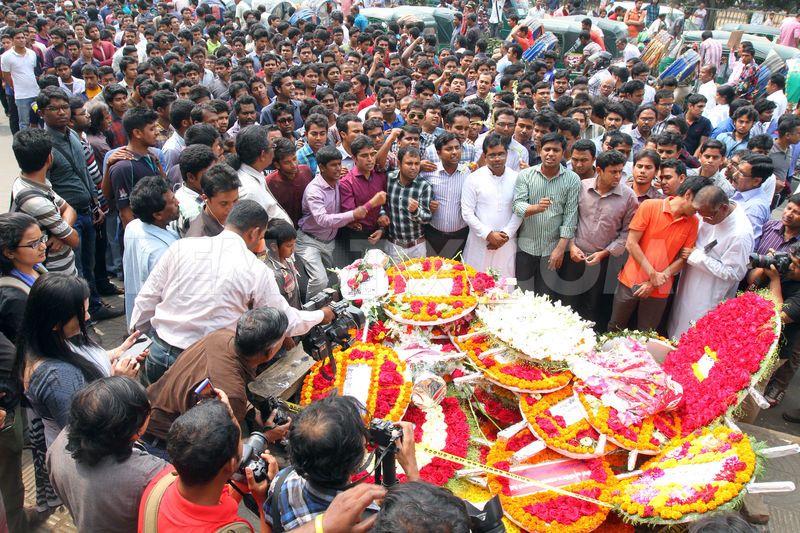Avijit Roy had received threats too often to take them seriously. The US citizen of Bangladesh origin had grown in Dhaka and his father, physics professor Ajoy Roy had lived through worse times . But when Islamist zealots killed blogger Rajib Haider at the beginning of the Shahbagh movement two years ago, every free thinking intellectual in Bangladesh should have been cautious.
Specially Avijit, because the zealots like Shafiur Rahman Farabi had threatened to kill him moment he returned to Bangladesh ( which he did once in a while). Avijit came to Dhaka with his blogger wife Rafida Ahmed Bonya on Feb 15 and started visiting the Ekushe Boi Mela immediately to launch his two recent books. One would imagine he should have asked for police protection. But he did not. The killers chose the spot to attack him carefully -- and clearly after following him for a few days.
The spot he was attacked is between Dhaka University, Suhrawardy Udyan and Ekushe Boi Mela which, despite Khaleda Zia's blockade and strikes have continued to draw huge crowds. That is a relatively forlorn and after-evening not a well-lit place but it is not far from the police van parked at the entry gate of Suhrawardy Udyan. How could two or three killers attack the couple and get away with a clean murderous hit will remain a mystery -- specially the lack of clue for 3-4 days that Bangladesh's police detectives were evidently suffering from.
PM Sheikh Hasina took the right decision by accepting the US offer to let the FBI investigate the murder that US has condemned in striongest terms. But nabbing Farabi whose vitriolic attacks against secular anti-fundamentalist bloggers has not led to any real breakthrough in the case. Police is yet to know who actually swung the machetes to bring down Avijit and his wife. Evidently, Farabi may be a conspirator but perhaps not the hit-men. And if Dhaka would need the FBI to trace the hit-men , it will surely not cover the Bangladesh police with glory.
Bangladesh has a powerful tradition of free thinking and secularism born out of the spirit of the 1971 Liberation War. The new generation of bloggers who take on the Islamist fanatics in the battle for Bangladesh's soul are the latest in the long generation of Bengalis who have fought against communalism and fundamentalism. Their numbers and the intensity of their commitment have grown over the years. Two years ago, they hit the streets of Dhaka in huge numbers and turned Shahbagh Square into a showpiece of mass mobilisation against Islamist fundamentalism at a time when Cairo's Tahrir Square was taken over by the supporters of Muslim Brotherhood. Their agitation forced the government to amend the law for trial of 1971 war criminals and led to the hanging of Jamaat-e-Islami leader Abdul Quader Molla. Avijit, a bio-engineer and a naturalised US citizen, was one of the spearheads of this progressive blogging fraternity in Bangladesh.
But even as the Shahbagh movement was gathering strength, blogger leader Rajib Haider was murdered near his home in Dhaka's Mirpur in February 2013. Two years later, in the same month when Bangladesh celebrates its Amar Ekushe (Immortal 21st - or 21st of February for saluting the martyrs of the Bengali Language movement) and the wonderful Bengal spring, you have a new martyr for the cause. In many ways, Avijit Roy's murder resembles those of Rajib Haider and the Rajshahi University teachers, Mohammad Yunus and Shafiul Islam. Or the murderous attack on popular writer Humayun Azad in 2004, who later died in Germany while under treatment.
Protest march in Dhaka, Bangladesh
The 1999 attack on popular poet Shamshur Rahman was the beginning of this new wave of periodic attacks against the secular Bengali intelligentsia, whose undying spirit made Bangladesh a reality. Islamist radicals, many returning from the jihad in Afghanistan, were organised into radical underground outfits like the Harkat-ul-Jihad-al-Islam (HuJI) or later the Jamaat-ul-Mujahideen Bangladesh (JMB). One can find a striking resemblance between these new Islamist radical groups and the Pakistan army and its local cohorts like the Al Badr, Al Shams and the Jamaat-e-Islami.
Barely two days before Dhaka fell to the Indian Army and the Mukti Bahini in December 1971, the Pakistanis and their cohorts had picked up the leading lights of the Bengali cultural brigade and brutally murdered them by dozens. The nation continues to observe December 14 as 'Shahid Buddhijibi Dibas’ (Martyred Intellectuals Day) to remember the likes of Shahidullah Kaiser and Munir Choudhury who were butchered by Islamist fanatics supporting the Pakistani war effort. For Pakistan's military rulers, these intellectuals were the specific targets because they were the ones who sold the dream of an independent secular Bangladesh to millions of their people.
Lawrence Lifschultz describes Bangladesh as an 'unfinished revolution'. The radical Islamist challenge has grown over the years since the Afghan jihad and 9/11 created a space for pan-Islamist jihad across the world. Secular Bangladesh anchored by powerful Bengali linguistic nationalism is an anathema for the thought leaders of the global jihad. No wonder, Ayman-Al-Zawahiri calls for a 'powerful uprising' against the present Awami League government. If Hasina government's determination to push for the 1971 war crimes trials is part of the effort to complete the 'unfinished revolution', the attacks on bloggers Rajib Haider and Avijit Roy, teachers Mohammed Yunus and Saiful Islam, writer Humayun Azad or poet Shamsur Rahman are all part of this 'counter revolution' - to turn Bangladesh on its head and bury the spirit of 1971.
So for those who see the violence during the Bangladesh Nationalist Party-sponsored agitation as a 'battle of the Begums', the murder of Avijit Roy will hopefully drive home the point that Bangladesh stands dangerously close to a violent confrontation that involves a fundamental challenge to the spirit of 1971 that led to its birth. That confrontation is linked to the one for political power, of the street battles and the fire bombings, because without political power neither the unfinished revolution nor the counter revolution can be won. Avijit Roy was murdered not by a foreign jihadi using sophisticated weapons but by homegrown fanatics using machetes, by people who know him well and who surely followed him for a week since he landed in Dhaka and started visiting the Ekushe Book Fair to launch his latest books. Books that advocated the spirit of science and the voice of reason in a world threatened by religious fanaticism.
Late Avijit Roy funeral procession at Dhaka
His murder will not silence the voice of secularism and reason in Bangladesh, if the responses of free thinkers and bloggers are anything to go by. The country has more men and women of courage and conviction espousing the spirit of 1971 than the jihadis can possibly kill. They transcend generations. But the Avijit Roy murder does not point to the fact that despite the massive crackdown by the Hasina government on Islamist militants, these zealots are still at large and can take down select targets . Veteran intellectual Shahriar Kabir's warning should be heeded -- "These zealots can one day attack Hasina" , he said after the Avijit Roy murder, fuming at what he described as a police failuire.
(Mr. Subir Bhaumik is a veteran journalist, former BBC correspondant and author of two well acclaimed books ‘Insurgent Crossfire’ and ‘Troubled Periphery’ )






